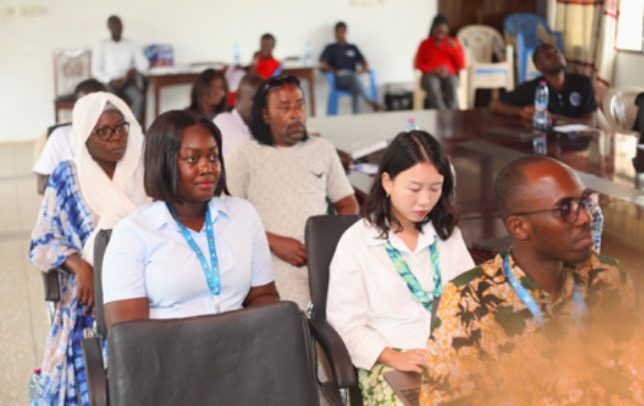The workshop in session
The Animal Research Institute (ARI) of the Council for Scientific and Industrial Research (CSIR) in collaboration with the Food and Agriculture Organisation of United Nations (FAO) are implementing a project titled “Strengthening Youth-Led Livestock Enterprises through Enhanced Capacity and Inputs Support” in two municipalities (Adentan and Ga West) in the Greater Accra Region.
The project is a pilot initiative aimed at addressing key gaps in capacity building, access to inputs and veterinary services.
It focuses on good husbandry practices, promotion of digital livestock production and strengthening the livestock (rabbit and poultry) value chain to create employment opportunities for the young farmers.
As part of the project outline to ensure the credibility, reliability and relevance of the results of the diagnostic study (first phase of the project), a validation workshop was organised at CSIR-Animal Research Institute on Thursday, April 3, 2025. The workshop participants included FAO members, experts from academia, Municipal Agriculture Directors, agricultural extension officers, and rabbit and poultry farmers.
During the presentation of the findings, Dr. Siegfred Affedzie-Obresi, a technical expert and member of the research team from the CSIR-Animal Research Institute, emphasised the need to conduct a thorough sensitisation exercise on the dangers associated with the use of antibiotics and the impact of antimicrobial resistance (AMR).
He stressed that although most rabbit and poultry farmers in the municipalities are aware of this phenomenon and its health implications, they do not follow the prescribed withdrawal period for the use of antibiotics. The non-compliance poses a serious public health risk, as drug residues in animal products could contribute to antibiotic resistance in humans.
He cautioned that improper use of antibiotic in livestock production could lead to the rise in bacteria resistance, making common infections difficult to treat. Dr. Affedzie-Obresi highlighted key challenges in poultry and rabbit production, including poor quality parent stock, disease outbreaks, high feed cost, weak marketing linkages and limited access to finance.
In her welcome address, Dr. Doris Yaa Osei, Acting Deputy Director of the CSIR-ARI and Project Team Leader, reaffirmed the Institute’s mandate to develop and transfer technologies that enhance livestock and poultry production in Ghana.
She highlighted that CSIR-Animal Research Institute plays a crucial role in research, extension, training and disease control in the livestock sector. Through these efforts, the Institute continues to support farmers with innovative research and development to improve productivity and resilience in animal agriculture.
Mr. Caesar Vulley, Regional Youth Employment Specialist for the Food and Agriculture Organisation Regional Office for Africa (FAORAF), stated that the diagnostic study on rabbit and poultry production has provided FAO with current insight into the challenges facing youth farmers. He emphasised that while there are common issues affecting all farmers, youth farmers face unique challenges that require targeted interventions.
Highlighting the importance of the diagnostic research, Mr. Vulley further noted that the project activities align with FAO’s focus on decent employment opportunities for youth within agriculture.


